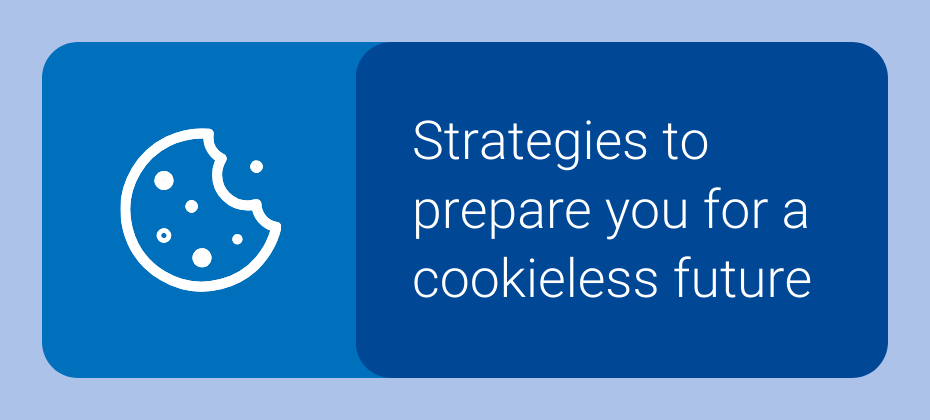Featured
Featured

A few weeks ago, Experian and OpenX hosted a supply-side think tank at our New York City office. Over 70 industry leaders met to talk about targeting in a cookieless future and how we can reach consumers in intentional ways. Publishers and supply-side partners shared what challenges they face, what solutions they’re considering, and what the future holds once the third-party cookie begins to deprecate in 2024. In this blog post, we’ll cover the top challenges, cookieless solutions, and actionable strategies we discussed at the event that can help publishers, their partners, and agencies make informed decisions about how to navigate tomorrow’s digital ecosystem. Four main challenges Four main challenges were discussed at the event: First-party data monetization Publishers possess a wealth of first-party data, but collecting and centralizing this information can be difficult for actionable insights. Streamlining data centralization and organizing first-party data is crucial for effective decision-making. Even with a wealth of first-party data, it's important to be aware of any blind spots in your data and enrich those gaps with data partners rooted in offline connections. “We appreciate the opportunity to participate in the supply-side think tank led by OpenX and Experian, two industry leaders in navigating a cookieless future. We're excited to collaborate with them on testing privacy sandbox APIs, identity resolution products, and audience development tools to enhance creator monetization and support an open internet amidst rapid technological and regulatory shifts.” Patrick McCann, SVP, Research, Raptive Lack of authenticated data and persistent IDs The deprecation of third-party cookies means there will be a shortage of authenticated user data and persistent identifiers. Without this information, targeting and personalization become more challenging. Participants discussed the need to find alternative ways to gather and use personal data responsibly. It’s time to start evaluating data partners who have accurate, multi-source compiled, privacy-compliant data with the dedication to reach and recency. Fragmentation and scale with alternative IDs currently in the market The multitude of alternative identifiers in the market poses a challenge for publishers. Each of these identifiers comes with its own set of rules and integration processes, leading to fragmentation and complexity. Publishers must find ways to navigate this landscape. Look to ID agnostic partners who provide a way to access multiple IDs at scale. “The industry needs a more streamlined standard to integrate alternative IDs, given the ongoing challenges of third-party cookie deprecation, measurement, and clean rooms. This burden falls heavily on product and engineering teams, who must prioritize and address these issues one at a time.” Ryan Boh, Head of Identity, Lockr Time Cookie deprecation is almost here. It is crucial to organize your legal, engineering, and product resources, and align internal go-to-market strategies. Establish partnerships that work with your team to follow these timelines and help build phased or cohesive strategies to prepare for a path to monetization. It is imperative to establish a sense of urgency and not wait for others to take the lead. Start testing now to determine if your infrastructure is ready and capable. Many partners who attended the think tank offered insights on how they’ve been tackling challenges to help their industry peers. Solutions and action plans for a cookieless future Participants discussed ways they are starting to prepare for a cookieless future and other approaches on their roadmaps: Work with data partners heavily rooted in offline data across the ecosystem Enriching your first-party data with partners who rely on offline IDs can help bridge gaps in your audience knowledge. This approach allows you to build a more complete audience profile while third-party cookies are still operational. Experian is rooted in deterministic offline data and has decades of experience managing it safely. We have insights on over 250 million U.S. consumers and 126 million U.S. households. With our digital technology assets, we bring in 4 billion devices and 1 trillion device signals to definitively connect offline records to online identifiers. With Experian identity widespread adoption throughout the industry, we're able to provide a common language for us all to collaborate. Experian identity organizes people into households, links their digital devices and IDs to them, enriches their identity with behavioral attributes, and then makes this data actionable in any environment, all while maintaining consumer privacy and data regulations. “Experian’s supply-side think tank provided a platform for publishers and AdTech companies to discuss the challenges posed by cookie deprecation, privacy regulation updates, and identity restrictions. It highlighted the need for AdTech companies to assist publishers in addressing anonymous users without requiring a value exchange -- fostering a mutually beneficial and privacy-compliant open web solution.”Anthony Caccioppoli, Head of AdTech & Solutions, Insider Develop your own persistent ID Creating and maintaining a proprietary persistent ID can be a valuable cookieless solution. It provides control and independence in the new environment post cookie, giving publishers the ability to maintain a consistent user profile. Use your data to expand contextual targeting opportunities Contextual targeting involves placing ads based on the content of the web page rather than user data. In the absence of cookies, this strategy can prove effective in reaching relevant audiences. “The masking or deprecation of IP addresses will eventually impact the availability of addressable IDs in non-authenticated web environments. In addition to ensuring maximum resiliency of our Graph and increasing support for authentication-based IDs, we are also investing in research and development around the use of other signals, such as contextual data, to maintain behavioral targeting inside non-authenticated environments. We will be sharing our findings and future plans in this space in the coming months.”Budi Tanzi, VP, Product, Experian Facilitate a knowledge exchange Reach out to your network to find out what others are testing and what’s working. Start collaborating with agencies and brands across the buy-side to meet their needs. “The collaborative spirit displayed by our partners constantly inspires me. Listening to the obstacles our industry faces allows this community to build strong relationships, create action plans, and deliver true value.”Carly Allcorn, Account Executive, Publisher & Supply-Side Partnerships, Experian Invest in an identity graph Invest in an identity graph provider to sync first-party cookies and addressable IDs. This ensures that your data remains accessible and actionable in a cookieless world. “Many participants at our think tank with Experian expressed the need to find an identity solution while also exploring other ways they can start to address cookie deprecation while maintaining business as usual.” Callie Askenas, Director of Publisher Development, OpenX How Experian and OpenX can help Graph from Experian captures all available digital identifiers in real-time and resolves them back to individuals and households. We’re signal agnostic, continuously expand the IDs we support, and futureproof identity resolution through a combination of deterministic, probabilistic, and cookieless identifiers. Experian is a key player in OpenX’s OpenAudience solution and helps to power many of their data segments as well as their identity graph. While OpenX collaborates with a variety of providers and operates a fully interoperable platform, Experian remains valuable to the core technology within OpenX’s supply-side platform (SSP). Experian can help you prepare for the cookieless future It’s clear that the cookieless future poses some unique challenges for publishers, but there are solutions. Publishers and their supply-side partners can come up with strategies to target consumers in intentional ways by continually testing multiple identifiers and cookieless solutions, developing their own persistent ID, creating velvet rope content, and returning to contextual targeting. Collectively, these actionable strategies can help ensure that publishers have a more successful transition into a cookieless future. Experian has been preparing for signal loss for quite some time and we continue to make substantial investments to ensure our resiliency and the resiliency of our customers. We continue to diversify our signal creating profiles with more persistent identifiers which allows us to pair authentication-based universal identifiers such as UID2 into our Graph seamlessly. Experian is ready and we are here to navigate the future of privacy together. To find out more about how Experian can help you prepare for the cookieless future, get in touch with a member of our team today. Get ready for the cookieless future with Experian Latest posts

Cookies are leaving us, but that doesn’t have to mean performance has to. That’s why Experian is taking the steps needed to future-proof identity in our Graph, including adding Unified ID 2.0 (UID2) from The Trade Desk. Experian currently supports UID2 in our Graph outputs for demand-side platforms (DSPs). UID2 support in our Graph outputs will be available to all approved partners by December 2023. In this blog post, we talk about why cookieless IDs, like UID2, that are coming to market because of cookie deprecation, are important, and how incorporating cookieless IDs into an identity graph can help you prepare for a cookieless future. What are cookieless IDs? Like cookies, cookieless IDs provide you with a comprehensive view of a consumer’s digital activity. Unlike cookies, identity providers produce cookieless IDs, using user-consented data and deterministic and probabilistic data signals (like hashed emails or mobile ad IDs). Cookieless IDs are a newer identifier that allows the advertising industry to maintain our understanding of consumers’ digital actions, helping to ensure we continue to generate smart, data-driven insights, targets, activation strategies, personalized experiences, and measurement and attribution. Why should you incorporate cookieless IDs into an identity graph? Adding cookieless IDs to an identity graph allows for licensees of the graph to: Resolve the universal ID to a consolidated consumer profile and know which other digital IDs tie to the cookieless ID Establish a unified view of the consumer with a privacy-compliant ID Produce data-driven and informed advertising strategies that still drive results, without the use of cookies Experian’s Graph Experian’s Graph is one of the most robust and signal agnostic identity graphs in the market. Experian’s Graph supports most digital IDs, including cookieless IDs, such as ID5, UID2, and Hadron ID. When you license Experian’s Graph, you increase your ability to better understand the different digital IDs that tie to a household or individual. Additionally, with our cookieless ID support, you can continue to understand your consumer and their digital IDs in the cookieless world. Why is it crucial to include UID2 support in Experian's Graph outputs? The Trade Desk is the largest, independent demand-side platform. They’ve created a cookieless ID, UID2, that they hope can power the advertising world to come across the open web. UID2 is an alternative solution to third-party cookies that when utilized in an identity graph, can offer a clearer picture of your consumer, enabling frequency controls and better management, across both digital and connected TV (CTV). Approved DSPs can add UID2s to their Experian Graph, giving them access to one of the more trusted and prominent cookieless IDs in the market today. Additionally, DSPs can use this identifier to decide whether to bid on certain inventory or not, on behalf of their advertiser partner. And, if we hedge our bets, it will only grow in prominence and use. While only available to approved DSPs today for use in the Experian Graph, the forthcoming encrypted UID2 token will provide this capability to the entire ecosystem, which allows us all to speak the same language and operate as efficiently as possible. "We are excited to support UID2, one of the premier IDs to support the future of addressability across the open internet, in the Experian Graph. We continue to see the adoption of UID2 across the demand-side ecosystem, increasing addressability across growing channels like CTV and beyond. I am personally excited to see how this momentum continues to increase over the remainder of 2023 and into 2024."chris feo, svp, sales & partnerships, experian Future-proof your identity strategy with Experian Graph and UID2 We’ve seen the impact that cookies have had on digital advertising and marketing. With the impending third-party cookie deprecation, you will need to adopt alternative cookieless ID solutions such as Unified ID 2.0. Experian is well-positioned to help you navigate this change, offering UID2 support in our Graph outputs for all approved partners by December 2023. Take the right steps now to future-proof your identity strategy and discover lasting success even without cookies. Alongside Experian’s Graph solution, you can achieve resilience in an ever-changing world of digital marketing and advertising. Now is the time to get ready for a cookieless future. Connect with an Experian team member to learn more about our Graph capabilities today. Learn more about Experian's Graph today Latest posts

Discover 2024 data collaboration strategies for better business intelligence. Learn to use data sharing, APIs, and secure frameworks.

We are excited to announce that we’ve updated our CAPE data with 2020 Census data. This release updates estimates and projections from 2010 and replaces all previous CAPE data attributes. U.S. Census data offers a great opportunity for data enrichment The U.S. Census is conducted every 10 years to determine the number of people living in the U.S. in addition to collecting data on dozens of topics across 130+ surveys and programs. U.S. Census data is already broken out into regional groups and covers 100k+ different geographies: States, counties, places, tribal areas, zip codes, and congressional districts. Block groups are the smallest geographic area for which the Bureau of the Census collects and tabulates data. They are formed by streets, roads, railroads, streams, other bodies of water, and other visible physical and cultural features. What is CAPE? Census Area Projections & Estimates data (CAPE) data from Experian utilizes a proprietary methodology to make the data easy to action on for marketing use cases. Made from U.S Census and Experian consumer data, CAPE data sets are developed at the block group and zip code level and targetable at the household level. CAPE 2020 updates CAPE 2020 uses the 2020 Census data blended with other Experian data to update CAPE’s unique attributes for data enrichment and licensing. Multiple sources are used and data is delivered at a block group level or zip code. Experian provides unique CAPE attributes not available through other sources that provide Census data. These include our Ratio and Percentages attributes, Score Factors/Segments, and Mosaic. CAPE 2020 use cases Our CAPE 2020 data sets enable strategic marketing analysis and decision-making. You can use CAPE 2020 data to understand the differences in the markets you serve as they relate to core demographics, housing attributes, education, income, employment, spending, and more. You can do this to: Find populations that are not typically captured in standard demographics. Cross-reference Census demographics data with other behavioral and shopper data. Understand supply and demand for products sold. Get started with our CAPE 2020 data today If you are using Experian’s CAPE 2010 data, please work with your Experian representative to migrate to CAPE 2020. If you are interested in learning more about our CAPE data, get in touch with us today. Latest posts

Centralized data access is emerging as a key strategy for advertisers. In our next Ask the Expert segment, we explore this topic further and discuss the importance of data ownership and the concept of audience as an asset. We're joined by industry leaders, Andy Fisher, Head of Merkury Advanced TV at Merkle, and Chris Feo, Experian’s SVP of Sales & Partnerships who spotlight Merkle's commitment to centralized data access and how advertisers can use our combined solutions to navigate industry shifts while ensuring consumer privacy. Watch our Q&A to learn more about these topics and gain insights on how to stay ahead of industry changes. The concept of audience as an asset In order to gain actionable marketing insights about your audience, you need to identify consumers who are actively engaged with your brand and compare them against non-engaged consumers, or consumers engaged with rival brands. Audience ownership Audience ownership is a fundamental marketing concept where marketers build, define, create, and own their audience. This approach allows you to use your audiences as an asset and deliver a customized journey to the most promising prospects across multiple channels. With this strategy, you enhance marketing effectiveness and ensure ownership over your audience, no matter the platform or channel used. Merkle enables marketers to own and deploy said asset (audience) so that marketers can have direct control over their audience. With audience strategy, you can tie all elements together – amplify your marketing reach, while maintaining control of your audience. Merkle connects customer experiences with business results. Data ownership Data ownership refers to the control organizations have over data they generate, including marketing, sales, product, and customer data. This data is often scattered across multiple platforms, making it difficult to evaluate their effectiveness. Alternatively, owning this data, which is typically housed in a data warehouse, allows the creation of historical overviews, forecasting of customer trends, and cross-channel comparisons. With advertisers and publishers both claiming ownership over their respective data and wanting to control its access, there has been a growing interest in data clean rooms. Data clean rooms The growing interest in data clean rooms is largely due to marketers increasing preference to maintain ownership over their audience data. They provide a secure environment for controlled collaboration between advertisers and publishers while preserving the privacy of valuable data. Data clean rooms allow all parties to define their usage terms – who can access it, how it is used, and when it is used. The rise in the use of data clean rooms strengthens data privacy and creates opportunities for deeper customer insights, which leads to enhanced customer targeting. Data clean rooms unlock new data sets, aiding brands, publishers, and data providers in adapting to rapidly changing privacy requirements. Why is centralized data access important? Centralized data access is crucial for the effective organization and optimization of your advertising campaigns. It involves consolidating your data in one place, allowing for the identification of inconsistencies. Merkle’s Merkury platform The concept of centralized data is a key component of Merkle’s Merkury platform, an enterprise identity platform that empowers brands to own and control first-party identity at an individual level. A common use case involves marketers combining their first-party data with Merkury's data assets and marketplace data assets to build prospecting audiences. These are later published to various endpoints for activation. The Merkury platform covers three classes of data: Proprietary data set – Permissioned data set covering the entire United States, compiled from about 40 different vendors Marketplace data – Includes contributions from various vendors like Experian First-party data from marketers – Allows marketers to bring in their own data Merkury's identity platform empowers brands to own and control first-party identity at an individual level, unifying known and unknown customer and prospect records, site and app visits, and consumer data to a single, person ID. This makes Merkury the only enterprise identity platform that combines the accuracy and sustainability of client first-party data, quality personally identifiable information (PII) data, third-party data, cookie-less media, and technology platform connections in the market. End-to-end management of data Data ownership and management enables you to enhance the quality of your data, facilitate the exchange of information, and ensure privacy compliance. The Merkury platform provides a comprehensive, end-to-end solution for managing first-party data, all rooted in identity. Unlike data management platforms (DMPs) that are primarily built on cookies, the Merkury platform is constructed on a person ID, allowing it to operate effectively in a cookie-free environment. A broader perspective with people-based views The Merkury platform is unique because it contains data from almost every individual in the United States, providing a broader perspective compared to customer data platforms (CDPs) which only contain consumer data. The platform provides a view of the world in a people-based manner, but also offers the flexibility to toggle between person and household views. This enables you to turn data into actionable insights and makes it possible to target specific individuals within a household or consider the household as a whole. How Experian and Merkle work together Experian and Merkle have established a strong partnership that magnifies the capabilities of Merkle's Merkury platform. With Experian’s robust integration capabilities and extensive connectivity opportunities, customers can use this technology for seamless direct integrations, resulting in more effective onboarding to various channels, like digital and TV. "Experian's role in Merkury's data marketplace is essential as they are considered the gold standard for data. It significantly contributes to our connectivity through direct integrations and partnerships. Experian's presence in various platforms and technologies ensures easy connections and high match rates. Our partnership is very important to us."andy fisher, head of merkury advanced tv Through this partnership, Merkle can deliver unique, personalized digital customer experiences across multiple platforms and devices, highlighting their commitment to data-driven performance marketing. Watch the full Q&A Visit our Ask the Expert content hub to watch Andy and Chris's full conversation about data ownership, innovative strategies to empower you to overcome identity challenges, and navigating industry shifts while protecting consumer privacy. Tune into the full recording to gain insights into the captivating topics of artificial intelligence (AI), understanding how retail networks can amplify the value of media, and the growing influence of connected TV (CTV). Dive into the Q&A to gain rich insights that could greatly influence your strategies. Contact us today About our experts Andy Fisher, Head of Merkury Advanced TV As the Head of Merkury Advanced TV, Andy's primary responsibility is driving person-based marketing and big data adoption in all areas of Television including Linear, Addressable, Connected, Programmatic, and X-channel planning and Measurement. Andy has held several positions at Merkle including Chief Analytics Officer and he ran the Merkle data business. Prior to joining Merkle, Andy was the EVP, Global Data & Analytics Director at Starcom MediaVest Group where he led the SMG global analytics practice. In this role, he built and managed a team of 150 analytics professionals across 17 countries servicing many of the world’s largest advertisers. Prior to that role, Andy was Vice President and National Lead, Analytics at Razorfish, where he led the digital analytics practice and managed a team of modeling, survey, media data, and business intelligence experts. He and his team were responsible for some of the first innovations in multi-touchpoint attribution and joining online/offline data for many of the Fortune 100. Andy has also held leadership positions at Personify and IRI. Andy holds a BA in mathematics from UC Berkeley and an MA in statistics from Stanford. Chris Feo, SVP, Sales & Partnerships, Experian As SVP of Sales & Partnerships, Chris has over a decade of experience across identity, data, and programmatic. Chris joined Experian during the Tapad acquisition in November 2020. He joined Tapad with less than 10 employees and has been part of the executive team through both the Telenor and Experian acquisitions. He’s an active advisor, board member, and investor within the AdTech ecosystem. Outside of work, he’s a die-hard golfer, frequent traveler, and husband to his wife, two dogs, and two goats! Latest posts

Bridging disparate data in a fragmented world In today's world, consumers engage with brands across multiple platforms, including social media, online marketplaces, in-store experiences, and customer service touchpoints. However, the main challenge for marketers and advertisers is the fragmentation of customer data across these different channels. Each platform generates its own set of data, which is stored in different databases and formats. Integrating these various data sources to create a unified view of the customer is a complex task involving technology and understanding customer behavior across different digital and physical channels. Businesses must link these data fragments to avoid creating a disconnected customer experience. For example, a person may browse products on a mobile app, ask questions through a customer service chat, and eventually purchase in an online marketplace. Traditional data analysis methods often need to recognize these activities as those of a single customer, which can result in missed opportunities to deliver personalized customer experiences across the customer journey. Identity resolution: The key to a unified customer experience Connecting online interactions across various platforms is a challenge for brands. Identity resolution enables enterprises to overcome this challenge by stitching together disparate signals and records to orchestrate experiences and analyze outcomes more effectively. By pairing Experian's identity capabilities with AWS Clean Rooms, enterprises can securely collaborate with their partners to derive deeper insights without exposing sensitive underlying data sets. This partnership between AWS and Experian enables effective matching between disparate data sets, bolstering privacy-enhanced media planning, insights, data enrichment, media activation, and measurement use cases. Depending on their distinct needs and existing identifiers, customers can use two specific offerings of Experian's identity resolution solutions paired with AWS Clean Rooms. Experian's identity resolution products ensure a frictionless brand experience across various channels, enhancing the customer journey from start to finish. Brands can employ our adaptable identity resolution solutions to forge connections between contextual, behavioral, lifestyle, and purchase-based data sources, assembling comprehensive customer profiles. Use dependable digital data to make informed decisions and elevate consumer engagement. Advanced deterministic and probabilistic features, combined with data science and cutting-edge technology, work hand in hand to mitigate risk and uphold data privacy. Such recognition enables a more comprehensive understanding of your clientele, fostering trust and amplifying campaign effectiveness by utilizing securely managed, standardized customer data. With this strategic approach, businesses can achieve their objectives regulatory-compliant. The consumer perspective: Why consistency matters Data fragmentation can lead to inconsistent experiences for consumers, which can be frustrating and erode brand trust. For instance, imagine receiving a promotional email for a product you already purchased through an app or being targeted for a product you decided against. Consumers are increasingly tech-savvy and demand a seamless, integrated experience regardless of how they interact with a brand. They want to feel valued and recognized at every touchpoint and don't care about the complexities of data analytics. As a result, brands face significant pressure to get identity resolution right. Data security and privacy: A Fort Knox for your data AWS Clean Rooms empowers their customers to establish a secure data clean room within minutes, facilitating collaboration with any other entity within AWS. This fosters the generation of unique insights regarding advertising campaigns, investment decisions, clinical research, and more. With AWS Clean Rooms, the need to store or maintain a separate copy of data outside the AWS environment for subsequent dispatch to another party for consumer insight analysis, marketing measurement, forecasting, or risk assessment becomes obsolete. AWS Clean Rooms provides an expansive set of privacy-enhancing controls for clean rooms. This includes query controls, query output restrictions, and query logging that allows customers to tailor restrictions on the queries executed by each clean room participant. Moreover, AWS Clean Rooms include advanced cryptographic computing tools that maintain data encryption—even during query processing—to adhere to stringent data-handling policies. This process employs a client-side encryption tool—an SDK or command line interface (CLI)—that utilizes a shared secret key with other participants in an AWS Clean Rooms collaboration. With a wealth of expertise in data privacy management, Experian enhances campaign effectiveness and fosters trust by managing standardized customer data securely. By using the identity graph, you can preserve a unique identity for each customer. This strategy enables you to comprehensively understand your clientele and reach your business objectives in a regulatory-compliant manner. The future of data-driven marketing starts here AWS customers can use AWS Clean Rooms to establish their own clean rooms in mere minutes, initiating the analysis of their collective data sets without sharing their underlying data with each other. Customers can use the AWS Management Console to choose their collaboration partners, select data sets, and configure participant restrictions. With AWS Clean Rooms, customers can effortlessly collaborate with hundreds of thousands of companies already using AWS without needing to move data out of AWS or upload it to a different platform. When running queries, AWS Clean Rooms accesses data in its original location and applies built-in, adaptable analysis rules to assist customers in maintaining control over their data. Coupled with Experian's trusted data privacy management and unique Experian ID, businesses can effectively manage customer data, secure partners' communication, and achieve regulatory-compliance objectives. This combination allows companies to use data-backed insights to supercharge their marketing initiatives, resulting in more meaningful customer interactions, improved match rates, and business success. Start collaborating About the authors Kalyani Koppisetti, Principal Partner Solution Architect, AWS Kalyani Koppisetti is a technology leader with over 25 years of experience in the Financial Services Industry. In her current role at AWS, Kalyani advises financial services partners on best-practice cloud architecture. Kalyani works closely with internal and external stakeholders to identify industry technical trends, develop strategies, and execute them to help Financial Services Industry partners build innovative solutions and services on AWS. Technical and Solution interests include Cloud Computing, Software-as-a-Service, Artificial Intelligence, Big Data, Storage Virtualization and Data Protection. Matt Miller, Business Development Principal, AWS In his role as Business Development Principal at AWS, Matt drives customer and partner adoption for the AWS Clean Rooms service specializing in advertising and marketing industry use cases. Matt believes in the primacy of privacy-enhanced data collaboration and interoperability underpinning data-driven marketing imperatives from customer experience to addressable advertising. Prior to AWS, Matt led strategy and go-to-market efforts for ad technologies, large agencies, and consumer data products purpose-built to inform smarter marketing and deliver better customer experiences. Tyler Middleton, Sr. Partner Marketing Manager, Experian Marketing Services Tyler Middleton is the Partner Marketing Lead at Experian. With almost 20 years of strategic marketing experience, Tyler’s focus is on creating marketing strategies that effectively promote the unique value propositions of each of our partners’ brands. Tyler helps our strategic partners communicate their mutual value proposition and find opportunities to stand out in the AdTech industry. Tyler is an alumnus of the Seattle University MBA program and enjoys finding new marketing pathways for our growing partner portfolio. Latest posts

Holiday shopping no longer starts in December. Consumers are responding to earlier promotions, moving fluidly between online and physical stores, and maintaining consistent spending despite economic uncertainty. Experian’s 2023 Holiday spending trends and insights report breaks down what’s changing and how marketers can respond. Here are three holiday spending insights shaping the 2023 holiday season. 1. Holiday spending is starting earlier Holiday momentum now builds well before December. Promotions tied to Cyber Week and early online deals are shifting spending into October and November, extending the window for planning and activation. Holiday sales by month vs. holiday sales (October-December) OctoberNovemberDecember202231%33%36%202130%32%38%202031%32%37%201930%33%38% Cyber Week alone accounts for 8% of total holiday spending. Early activity rewards brands that show up sooner with relevant offers and consistent messaging. Marketers that plan for earlier holiday spending stay visible throughout the entire purchase cycle. How can you apply these holiday spending insights to your campaigns? Reach the right shoppers with your promotions with sell-side targeting. This approach gives you control over where ads appear while supporting visibility through direct publisher connections across mobile, web, and connected TV (CTV). Earlier reach helps keep your brand present as shoppers move from browsing to buying. 2. Online holiday spending continues to grow Shoppers are increasingly researching, comparing prices, and planning purchases online. Online holiday spending increased 1% year-over-year, while in-store activity saw a 1% year-over-year decrease. Online vs. in-store sales in 2022 by month (October-December) OctoberNovemberDecemberOnline29%34%38%In-store32%32%36% Online sales still represent about one-third of total holiday shopping, but growth opportunities remain strong, especially in categories like electronics, office supplies, and gaming. Even when purchases happen in-store, online activity often plays a role earlier in the journey. How can you apply these holiday spending insights to your campaigns? Support omnichannel shopping behavior with an agnostic identity graph. By connecting device and media signals, you can bring together online and offline activity, gain a clearer view of your audience, and make informed decisions about channel mix and budget allocation. 3. Holiday spending remains steady year-over-year Holiday spending in 2023 is tracking closely with 2022, signaling consistent consumer intent throughout the season. Last year’s early promotional response in October was followed by steady spending through year end. Year-over-year change on average consumer spending OctoberNovemberDecember2020 vs. 201914%12%10%2021 vs. 20206%8%5%2022 vs. 20217%3%2% Overall holiday spending increased by 2% in 2022. That stability gives marketers room to focus on optimization and measurement, rather than reacting to short-term swings. When conditions remain consistent, it becomes easier to tie media decisions to meaningful business outcomes. How can you apply these holiday spending insights to your campaigns? Strengthen your strategy with data enrichment. Adding deeper insight into shopper preferences and behaviors helps tailor messaging and maintain consistency across channels, supporting stronger connections throughout the season. Key takeaways Holiday spending is starting earlier, driven by promotions in October and November Online shopping continues to grow, with online and in-store journeys closely connected Overall holiday spending remains consistent with last year, supporting confident planning Get ready for the 2025 holiday season 2025 Holiday spending trends and insights report Download Experian's 2025 Holiday spending trends and insights report, in collaboration with GroundTruth. Inside you'll find: When shoppers plan to buy Why stores still drive results Where marketers are placing their bets How AI is shaping discovery Access our full set of predictions and plan your next holiday season now. Download now Connect with us FAQs What holiday spending trends does Experian expect marketers to plan around in 2023? Experian’s 2023 holiday spending analysis shows shoppers starting earlier, engaging more through digital channels, and maintaining steady year-over-year spend. These behaviors extend the season and reward brands that activate sooner. For marketers, this creates a longer runway to influence demand and measure impact. How does Experian help marketers connect online and in-store holiday spending? Experian uses identity as the foundation to connect digital exposure with in-store and online purchase behavior. This approach allows marketers to see how holiday spending unfolds across channels rather than treating each interaction separately. The result is a clearer view of how media drives outcomes throughout the season. Latest posts

As technology reshapes our media experience, TV remains a powerful channel for content consumption. In our next Ask the Expert series, we dive into a pivotal subject – the convergence of TV, linear (conventional broadcast and cable TV), and digital marketplaces. In this Q&A segment, we’re joined by two industry experts, Dan Hickox, VP of Development & Partnerships at 605, an iSpot.tv Company, and Chris Feo, Experian’s SVP of Sales & Partnerships, who guide us through an engaging discussion on convergent TV, attribution, measurement, and safeguarding personal data in the evolving landscape of TV advertising. How convergent TV is changing the future of advertising The convergence of traditional TV and digital streaming platforms presents an innovative opportunity for advertisers to engage their target audience. With convergent TV, you can create campaigns that bridge the gap between linear and streaming, ensuring your message reaches your target audience while avoiding ad fatigue. Along with high-quality content, extensive inventory, and targeting capabilities, convergent TV offers advanced measurement and attribution tools that will empower you to optimize advertising campaigns for maximum impact. You can make better decisions regarding when and where to strategically allocate your advertising budgets with effective TV measurement and attribution. Attribution in converged TV TV attribution involves tracing consumer actions and uncovering valuable insights into their behavior. With these insights, you can gain a clear understanding of the audience exposed to your ads and their actions in response. Lean into data attribution tools to track your target audience throughout the customer buying journey. Measurement in converged TV In contrast, TV measurement enables the tracking of performance TV advertising campaigns to assess campaign effectiveness. Through converged TV measurement solutions, you can rely on a singular data source, unifying different channels, devices, and metrics for actionable insights. This analysis will give you insights into the audience reached, their location, and the resulting actions taken. TV attribution’s impact on cross-channel media Embracing an omnichannel advertising approach is vital. Evaluating advertising campaigns across various platforms and devices – including linear, TV, and digital channels – is essential for identifying the channels that drive revenue for your businesses. Converged TV and digital streaming enable you to control ad frequency across all channels, enhancing the cross-screen experience. This convergence paves the way for a more comprehensive and holistic future in advertising. Here are three ways TV attribution impacts cross-channel media. Identify the most effective channels TV attribution offers a significant advantage in determining the channels that generate the most conversions. By using this data, you can make informed choices about budget allocation to achieve maximum impact. Deliver a seamless customer experience Consumers demand consistency in their brand interactions. TV attribution can help you by guiding the optimal timing and placement of ads, resulting in a more seamless viewing experience. This synchronization can significantly enhance customer loyalty and retention. Enhance marketing effectiveness By identifying the most effective channels and refining campaign strategies, TV attribution can significantly improve the success of marketing campaigns. The outcome is a measurable increase in sales and revenue, demonstrating the impact of informed and data-driven advertising. Audience-based targeting across linear and digital ecosystems It's crucial to comprehend and connect with the appropriate audience. The emergence of linear and digital platforms has required the development of audience targeting. Across these two ecosystems, audience-based targeting aims to enhance this process by concentrating on specific audience segments rather than general demographics or programming. Benefits of audience-based targeting There are four key benefits of audience-based targeting across the TV ecosystem. Personalization at scale Digital platforms have conditioned users to expect tailored experiences. Audience-based targeting ensures ads resonate with individual preferences and behaviors, even within the vastness of linear TV. Combining data from both linear and digital sources makes it possible to segment audiences more precisely. This results in advertising content tailored to each individual, making it more relevant and personalized. Optimized ad spend Improve your return on investment by targeting specific audience segments more likely to convert, ensuring your messages reach suitable viewers. In contrast to traditional TV purchasing, where advertisement slots are bought based on a show's overall demographic, audience-based targeting focuses on the viewers' behavior and interests, regardless of the program they are watching. Unified measurement and analytics When combining traditional and digital methods of reaching target audiences, it is essential to have a consistent approach to measuring success. By doing this, you can gain insight into how well your ad campaigns perform across different platforms and the frequency with which they are being seen. By comprehensively understanding audiences within different ecosystems, you can adjust your strategies in real time, guaranteeing that your campaigns remain flexible and successful. Enhancing the viewer experience Audience-based targeting benefits viewers by reducing the number of irrelevant ads they see. As a result, viewers can have a more pleasant experience while watching content, which may discourage them from skipping ads and increase their engagement with the content. Future-proofing and safeguarding data Businesses are focusing on future-proofing for data privacy, and safeguarding individual data is becoming more significant than ever before. Now’s the time to embrace new methods that protect your data privacy while ensuring that measurement remains accurate. Experian offers privacy-safe solutions to help businesses preserve precise measurement, even with fewer cookies. "What we're working toward is future-proofing ourselves. To do that, we work with partners like Experian who are already thinking forward, and with your pixel technology, we can capture and resolve the identifiers that we know will be around for a while."Dan Hickox, VP, Solutions Consulting, Development & Partnerships, 605 How Experian and 605 work together 605 is an independent TV measurement and analytics company providing solutions for advertising, content measurement, attribution, planning, optimization, and media transactions. “We partner with great identity partners, such as Experian, that really help us act as the connecting glue across different data touch points. So what it really is, is the ability to have holistic measurement across the different channels, across the different audiences and it starts out with the ability to be able to take disparate data sources and match them together.”Dan Hickox, VP, Solutions Consulting, Development & Partnerships, 605 605 and Experian have a strong partnership that enables 605 to enhance its data through Experian’s Consumer Sync and Pixel solutions. Consumer Sync – 605 utilizes Experian’s Consumer Sync to ensure their data is privacy-compliant and deterministic across all sources. Experian identity organizes people into households, links their digital devices and IDs to them, enriches their identity with behavioral attributes, and then makes this data actionable in any environment, all while maintaining consumer privacy and data regulations. Web Pixel Attribution – 605 utilizes Experian’s pixel solutions to generate web pixel attribution reports on a client-by-client basis – for linear, TV, and cross-platform reporting. 605’s reporting capabilities allow customers to understand their marketing campaigns' true impact and precisely identify high-performing strategies. With the Experian pixel, partners like 605 can learn more about anonymous website visitors by linking associated demographics and behavior attributes, build audience segments based on the highest cart value customers, and more. The 605 and Experian partnership work hand in hand to make linear TV as actionable as digital media for you. Customers can prove the effectiveness of their marketing tactics and gain actionable insights to deliver highly impactful campaigns. Watch the full Q&A Visit our Ask the Expert content hub to watch Dan and Chris's full conversation about TV measurement, data analytics, privacy regulations, and the evolving landscape of TV advertising in the digital age. Contact us About our experts Dan Hickox, VP, Solutions Consulting, Development & Partnerships, 605 As the Vice President of the Solutions Consulting team, Dan collaborates with sellers to turn prospective opportunities into long-term client relationships. He leads new initiatives and drives partnerships that expand 605 capabilities and improve marketplace positioning. Dan brings over a decade of cross-channel media experience in advanced analytics, media optimization, data integration and statistical analysis to 605. Chris Feo, SVP, Sales & Partnerships, Experian As SVP of Sales & Partnerships, Chris has over a decade of experience across identity, data, and programmatic. Chris joined Experian during the Tapad acquisition in November 2020. He joined Tapad with less than 10 employees and has been part of the executive team through both the Telenor and Experian acquisitions. He’s an active advisor, board member, and investor within the AdTech ecosystem. Outside of work, he’s a die-hard golfer, frequent traveler, and husband to his wife, two dogs, and two goats! Latest posts

Over the last few months, Experian has released new syndicated audiences to most major platforms supporting retail and travel. In this blog post, we’ll highlight some of these new audiences and how they can be used with other data from Experian to build the perfect audience to reach your customers and prospects. What separates Experian's syndicated audiences Experian’s 2,400+ syndicated audiences are available directly on over 30 leading television, social, programmatic advertising platforms, and directly within Audigent for activation within private marketplaces (PMPs). Reach consumers based on who they are, where they live, and their household makeup. Experian ranked #1 in accuracy by Truthset for key demographic attributes. Access to unique audiences through Experian’s Partner Audiences available on Experian’s data marketplace, within Audigent for activation in PMPs and directly on platforms like DirectTV, Dish, Magnite, OpenAP, and The Trade Desk. Household Expenditure audiences We’ve created new predictive audiences to help retailers reach consumers across 35 categories likely to spend within that category. A few categories include Apparel, DIY, Health, and more. With the launch of these new audiences, we will retire our existing Household Consumer Expenditure, Online and Retail category audiences in the November Digital Master update. Who these audiences are for Our Household Expenditure audiences use data from multiple sources, providing brands with highly accurate purchase predictions and data that scales for digital execution. Household Expenditure audiences are an excellent solution for brands with new product lines or where targeting based on historical purchases lack signal brands seek. Building data from multiple data sources helps ensure high performance and accuracy and can illuminate trends in consumer shopping patterns. These trends can be used to help predict future shopping behaviors. How to refine our Household Expenditure audiences To refine your audience, you can combine this data with Experian’s demographic and household expenditure audiences to ensure you are reaching consumers. For example, suppose you’re an apparel brand launching a new line aimed toward women over the age of 40. In that case, you can use Experian’s demographic data to reach those women and layer in our household expenditure purchase predictor segment for women's apparel to reach their new target audience. Mobile Location audiences We’ve expanded our location database to include more locations and points of interest. With this new data, we could strengthen our existing mobile location audiences to broaden the reach, improve accuracy, and increase performance. We’ve created 11 new mobile location audiences with our new dataset that supports the retail and travel verticals. These new audiences include new shopping behaviors, including high-income and high-end shoppers and travel and entertainment behaviors, including visiting sporting arenas like MLB, NBA, NFL, and university stadiums. Who these audiences are for These audiences are for brands that want to reach consumers based on their location behaviors. Often valid for retail, travel, and entertainment brands, Mobile Location audiences provide brands with highly accurate data that shows previous intent and interest in critical locations. How to refine our Mobile Location audiences To refine your audience, you can combine your Mobile Location audience with Lifestyle and Interest data. For example, if you are creating an advertising campaign for a hotel near a university stadium for the largest game in the season, you could combine university stadium visitors with sports enthusiasts and in-market for travel to find consumers most likely to be interested in your campaign and staying at the hotel. Purchase-Based Transaction audiences For use cases where predictive audiences aren’t the best fit to reach the right consumer, such as targeting consumer’s historical purchases, we’ve created new purchase-based transaction audiences that utilize opt-in consumer transaction data across 29 retail categories, including apparel, home, lifestyle, health, food and beverage, and more. Who these audiences are for These audiences are a perfect fit for brands trying to reach consumers based on previous purchases. These audiences can be broken out by their spending patterns – frequency of purchase and high spenders – and their response to advertising, including direct mail, email, inserts, and digital. How to refine our Purchase-Based Transaction audiences Combine these new audiences with Mosaic to fine-tune your audience based on their purchasing and lifestyle patterns. Suppose you are a brand with a new line of home décor products launching and will utilize influencers to endorse your product line. In that case, you can use Experian’s purchase-based transaction audiences for high spenders in home décor and layer our Mosaic audience Influenced by Influencers to find consumers who are most likely to purchase and trust an influencer. We can help you discover and activate your perfect audience Our audiences are available in most major data and execution platforms. Visit our partner page for more information. Don’t see our audiences on your platform of choice? We can help you build and activate an Experian audience on the platform of your choice. Contact us Latest posts